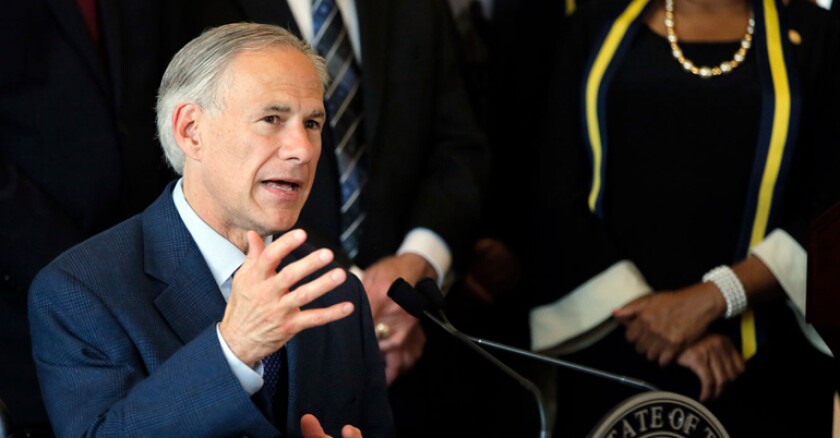Abbott is leading a push for a national constitutional convention in hopes of enacting numerous amendments to restrict federal power. “I realized it’s going to take more than lawsuits to fix what’s wrong in Washington, D.C.,” Abbott says. “We have all three branches of government that are trampling the Constitution.”
Under Article V of the U.S. Constitution, a constitutional convention can be called by a vote of two-thirds of the state legislatures. It’s not unusual for legislatures to approve such resolutions. Typically, however, they call for amendments to address individual topics -- a balanced budget requirement, for example, or campaign finance restrictions that would overturn the Supreme Court ruling known as Citizens United.
Abbott’s plan is wider in scope. He seeks not only to require a balanced federal budget, but to block federal agencies from preempting state laws. He wants a vote by two-thirds of the 50 states to have the power to override federal laws or Supreme Court decisions. Abbott has a total of nine amendments that would restrict federal authority in one fashion or another.
Already, a half-dozen states have answered Abbott’s call. But questions surrounding a proposed convention of the states arise immediately. For one thing, it’s not clear whether the votes already taken will still count next year, or if a two-thirds majority of states must approve resolutions all within the same year. It’s uncertain whether the anti-Citizens United resolutions that have been approved would count along with Abbott’s proposal toward reaching the two-thirds threshold, or whether states have to be uniform in terms of a proposed agenda. “The states keep piling on calls for a convention, and no one is sure how they should be counted up,” says Jonathan Marshfield, a law professor at the University of Arkansas.
If and when Abbott or some other organizer gets two-thirds of the states to agree, presumably one of the disagreeing states would sue to block the convention from taking place. The Supreme Court would then have to decide whether a convention can happen.
Even if justices gave the green light, there’s no certainty about what the rules governing a convention might be, such as whether delegates from a state would vote as a bloc or as individuals. For all these reasons, some legal scholars have argued that the first order of business should be proposing an amendment that would clarify the entire process. “Article V is the black hole of constitutional law,” Marshfield says. “There’s just so much we don’t know.”
The uncertainty is one reason why an Article V convention has never taken place. It’s not even clear whether a convention would or could be limited in terms of its agenda. The entire Constitution might be fair game. That makes lots of people nervous.
But not Abbott. He fully recognizes that liberal states are likely to propose changes that he and other conservatives would balk at. His response is, in essence: Bring it on. Because Republicans control a majority of states, he asserts, now is the time to fix the Constitution.
“I was fascinated by the Abbott proposal because it seeks to turn into a virtue what had been seen as a drawback -- the inability to put a lid on topics,” says Walter Olson, a senior fellow at the libertarian Cato Institute’s Center for Constitutional Studies. “Abbott turns it around and says, ‘Let’s go ahead and open the agenda, fully understanding there are ideas that I don’t like.’”









